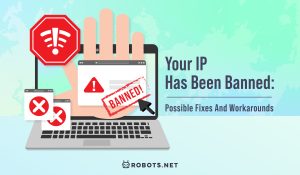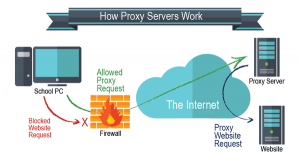Introduction
Welcome to the world of the internet, where countless websites, forums, and online platforms provide a space for people to connect, share ideas, and engage in discussions. However, with the ever-growing prevalence of online activities, there comes the need for regulations and measures to maintain a safe and fair environment for all users. One such measure is IP banning, which can have significant consequences for individuals.
IP banning, or Internet Protocol banning, is a process by which a specific IP address or range of IP addresses is blocked from accessing a particular website or online service. It is a way to restrict or limit access to users who may have engaged in inappropriate behavior, violated the terms of service, or committed acts of spamming, hacking, or abusive conduct.
Understanding IP banning is crucial for anyone who uses the internet regularly. In this article, we will delve into the concept of IP banning, explore the reasons why it is implemented, discuss the consequences of being IP banned, and provide tips on how to avoid being banned. By the end of this article, you will have a clearer understanding of IP banning and how to navigate the online world more effectively.
Definition of IP Banned
Before we delve deeper into the concept of IP banning, let’s first clarify what it means to be IP banned. As mentioned earlier, IP banning involves blocking a specific IP address or range of IP addresses from accessing a website or online service.
Every device that connects to the internet is assigned a unique IP address, which serves as its digital identifier. This IP address acts as a virtual address for the device, enabling it to send and receive data over the internet. It is similar to a physical address that allows mail to reach its intended recipient.
When a website or online service decides to ban an IP address, it essentially denies access to that particular device or network. This means that anyone using the banned IP address will be prevented from accessing the website or service, regardless of the device they are using. The ban may be temporary or permanent, depending on the severity of the violation and the discretion of the website or service administrator.
IP banning is typically carried out as a measure to enforce rules and policies or to protect the online community from harmful activities. By blocking specific IP addresses, website administrators can effectively prevent individuals from engaging in misconduct, spamming, hacking, or any other activities that may disrupt the normal functioning of the website or online service.
It’s important to note that IP banning is not limited to individual users; it can also target entire networks or regions if they are found to be sources of abusive or malicious behavior. This ensures that the actions of a few do not negatively impact the experience of the wider user base.
In the next section, we will explore the various reasons why websites and online services resort to IP banning, shedding light on why this practice is so prevalent in the online world.
Reasons for IP Banning
IP banning is implemented by websites and online services for a variety of reasons, all aimed at maintaining a safe and fair environment for users. Let’s examine some of the most common reasons why IP banning is carried out:
- Violation of Terms of Service: Websites and online services often have specific terms of service that users are required to adhere to. If users violate these terms, such as engaging in spamming, harassing others, or sharing inappropriate content, the website administrators may opt to ban their IP address in order to enforce the rules and protect the community.
- Abusive Behavior: Online platforms rely on healthy interactions and respectful communication among users. If an individual displays abusive behavior, such as bullying, trolling, or consistently harassing others, their IP address may be banned to safeguard the well-being of other users and maintain a positive online atmosphere.
- Hacking or Unauthorized Access: IP banning is an effective way to prevent hackers or individuals attempting to gain unauthorized access to sensitive data. By banning their IP address, websites can block their access and protect vital information from being compromised.
- Spamming and Bot Attacks: Spamming, especially in the form of mass unsolicited messages or advertisements, can severely disrupt the functionality of a website or online service. IP banning can help mitigate this issue by blocking the offending IP addresses responsible for spamming and preventing them from further compromising the user experience.
- Terms Violation by Proxy Servers: Proxy servers can be used to mask one’s real IP address and bypass geographical restrictions or access content that is otherwise blocked. However, if a proxy server is found to be used in violation of a website’s terms of service, the associated IP addresses may be banned to prevent misuse or unauthorized access.
These are just a few examples of why IP banning may be necessary. It is important for website administrators to strike a balance between providing a welcoming environment for users and taking necessary measures to enforce rules and protect the integrity of their platforms.
In the next section, we will discuss the consequences that individuals face when they are IP banned, shedding light on the impact it can have on their online experience.
Consequences of IP Banned
Being IP banned can have significant consequences for individuals, affecting their ability to access certain websites or online services. Here are some of the most notable consequences:
- Restricted Access: The primary consequence of being IP banned is that you will no longer be able to access the website or online service from the banned IP address. This can be frustrating, especially if it’s a platform you regularly use for work, communication, or entertainment.
- Limited Participation: If you’re IP banned from an online community or forum, you won’t be able to participate in discussions, share your opinions, or engage with other members. This can hinder your ability to connect with like-minded individuals or seek support from the community.
- Data Loss: In some cases, IP banning may also result in loss of access to your personal data or account associated with the banned IP address. This can be problematic if you haven’t backed up your data or if you relied heavily on the website or service for storing important information.
- Reputation Damage: If you were IP banned due to violating the terms of service or engaging in abusive behavior, it can tarnish your online reputation. Others may view you negatively, which could impact your professional or personal relationships in the digital space.
- Work or Productivity Disruption: If you depend on a specific website or online service for work or productivity, being IP banned can interrupt your workflow and hinder your ability to complete tasks efficiently. It may require finding alternative methods or platforms to carry out your work, causing delays or additional hassle.
It’s essential to note that being IP banned doesn’t necessarily mean you can’t access the website or service at all. If you have access to a different IP address, such as using a different device or connecting through a VPN, you may still be able to bypass the ban. However, circumventing the ban in this manner may violate the terms of service and could have legal consequences.
In the next section, we will explore how you can check if your IP is banned and take appropriate actions to rectify the situation.
How to Check if Your IP is Banned
If you suspect that your IP address has been banned from accessing a specific website or online service, there are a few methods you can use to check if your IP is indeed banned. Here are some steps you can take:
- Attempt Access: The simplest way to check if your IP is banned is by attempting to access the website or service. If you receive an error message or are unable to load the page, it could be an indication that your IP address is blocked. However, keep in mind that there could be other reasons for not being able to access the website, such as a temporary server issue or a problem with your internet connection.
- Use Online IP Checking Tools: Several online tools allow you to check the status of your IP address and determine if it has been banned. These tools analyze your IP against various databases and blacklist records to detect any restrictions. Simply search for “IP checker” or “IP blacklist checker” in your preferred search engine to find relevant tools.
- Contact Website Administrator: If you are unable to access the website or if the online tools indicate that your IP is not banned, it is possible that there may be other issues preventing your access. In such cases, it is advisable to reach out to the website administrator or support team for assistance. They can provide you with more information regarding any bans or limitations on your IP.
- Try Alternate IP Addresses: If you have access to multiple devices or networks, you can try accessing the website or service using a different IP address. This may involve using a different device, connecting to a different network, or utilizing a VPN service. If you can access the website or service using a different IP, it indicates that your initial IP address may indeed be banned.
By following these steps, you can determine if your IP address is banned and gather more information about the situation. In the next section, we will discuss steps you can take to get unbanned from an IP ban and regain access to the website or service.
How to Get Unbanned from IP Ban
If you find that your IP address is indeed banned from a website or online service, there are several steps you can take to try and get unbanned. While success cannot be guaranteed, these strategies may increase your chances of having the ban lifted:
- Contact Website Support: Reach out to the website or service’s support team via email or contact form, explaining the situation politely. Express your willingness to resolve any issues or concerns and request that they reconsider the ban on your IP address. Be sure to provide any relevant details, such as your username or past actions on the platform, to aid their investigation.
- Issue a Public Apology: If your ban was the result of violating the website’s terms of service or engaging in inappropriate behavior, consider issuing a public apology. This could be through a forum post, comment, or direct communication with website administrators. Taking responsibility for your actions and demonstrating genuine remorse may showcase your willingness to change and improve.
- Submit an Appeal: Some websites or online services have an appeal process specifically designed for users who believe they were unfairly IP banned. Look for information on their website regarding ban appeals, and follow the outlined procedure to submit your case. Be sure to present your argument in a clear, concise, and respectful manner, providing any evidence or explanation to support your appeal.
- Reset Your IP: If you have a dynamic IP address, you can try resetting it. This can be done by disconnecting and reconnecting your modem or router, or by contacting your internet service provider (ISP) and asking for a new IP assignment. However, keep in mind that this method may not work if the ban is based on a range of IP addresses.
- Use a VPN: If your IP ban is specific to your current IP address, using a VPN (Virtual Private Network) can help you bypass the ban. A VPN allows you to connect to the internet through a different IP address, effectively masking your original IP. Be aware, however, that circumventing a ban using a VPN may violate the website’s terms of service, so proceed with caution.
It’s important to remain patient and respectful throughout the process of seeking to get unbanned. Understand that the decision ultimately lies with the website or service administrators, and they have the right to uphold or lift the ban based on their policies and investigations.
In the final section, we will provide some useful tips to help you avoid IP banning in the future.
Tips for Avoiding IP Banning
IP banning can be a frustrating experience, but there are steps you can take to minimize the risk of being banned in the future. By following these tips, you can maintain a positive online presence and avoid the consequences of an IP ban:
- Read and Follow Terms of Service: Familiarize yourself with the terms of service of websites or online services you use regularly. Understand the rules and guidelines and make a conscious effort to adhere to them. This will help you avoid any unintentional violations that may result in a ban.
- Respect Others and Engage Responsibly: Treat other users with respect and engage in a constructive and positive manner. Avoid engaging in personal attacks, spreading misinformation, or engaging in any form of harassment. Respect the diversity of opinions and maintain a healthy and inclusive online environment.
- Protect Your Account Security: Take steps to secure your online accounts by using strong and unique passwords, enabling two-factor authentication, and regularly updating your account information. This will help prevent unauthorized access to your account, which may lead to suspicious activities and potentially an IP ban.
- Be Mindful of Automated Activities: Avoid engaging in activities that might trigger automated systems to flag your IP address, such as excessive posting, repetitive actions, or suspicious browsing behavior. These activities can be misconstrued as spamming or hacking attempts, potentially resulting in an IP ban.
- Report Issues and Follow Proper Channels: If you come across any issues or encounter suspicious behavior on a website or online service, report it to the appropriate channels. Most platforms have reporting features or dedicated support teams for handling such issues. By reporting problems promptly, you contribute to maintaining a safe and secure online environment.
- Stay Informed and Educate Yourself: Keep up-to-date with the latest trends, rules, and policies in the online world. Educate yourself about best practices, online etiquette, and potential risks. By staying informed, you can make informed decisions and avoid activities that may lead to an IP ban.
Remember, prevention is better than cure when it comes to IP banning. Taking proactive measures to maintain a positive online presence will not only help you avoid potential bans but also contribute to a healthier and more enjoyable online experience for everyone.
As we conclude this article, we hope that the information provided has shed light on the concept of IP banning, its consequences, and the steps you can take to avoid and overcome it. By being aware of and respecting the rules and guidelines of online platforms, you can navigate the digital world with confidence and make the most of your online interactions.
Conclusion
IP banning is a technique used by websites and online services to regulate user behavior and maintain a safe and fair environment. Understanding the concept of IP banning is crucial for anyone who regularly uses the internet. In this article, we have explored the definition of IP banning, the reasons why it is implemented, the consequences it can have on individuals, and steps to check if your IP is banned and get unbanned if necessary.
We have discussed how IP banning can restrict access to websites and online services, limit participation in online communities, and potentially damage one’s online reputation. However, there are ways to check if your IP is banned, including attempting access, using online IP checking tools, contacting website support, or trying alternate IP addresses.
If you find yourself IP banned, there are steps you can take to get unbanned, such as contacting website support, issuing a public apology, submitting an appeal, resetting your IP, or using a VPN. Keep in mind that success in getting unbanned is not guaranteed, but approaching the situation respectfully and providing relevant information can increase your chances of a favorable outcome.
To avoid the pitfalls of IP banning, we have provided several tips, including familiarizing yourself with terms of service, engaging responsibly and respectfully with others, securing your online accounts, being mindful of automated activities, reporting issues, and staying informed about online best practices.
By following these tips and being conscious of your online behavior, you can minimize the risk of being IP banned and create a positive online presence. Remember, the internet is a valuable tool for communication, collaboration, and knowledge-sharing, and by using it responsibly, we can all contribute to a safer and more inclusive online community.

























